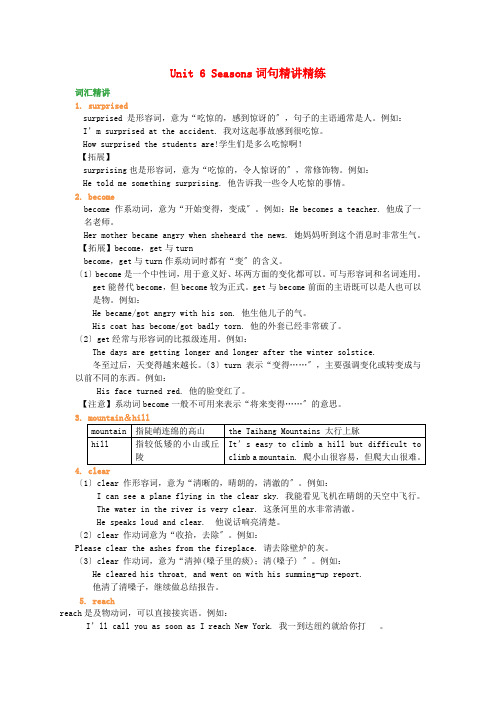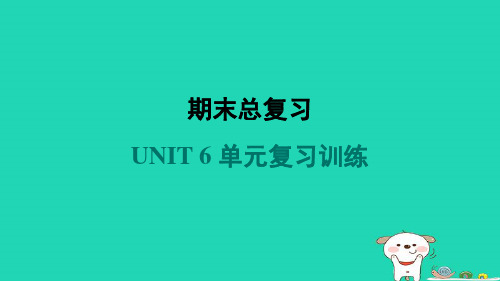七年级英语下册unit6seasons词句精讲精练新版冀教版
冀教版英语七年级下册Unit 6 Seasons单元知识点归纳总结

Unit 6 Seasons必背单词1. strange adj. 奇怪的;奇特的;不熟悉的→stranger n. 陌生人2. notice v.注意到;看到n. 布告;启事→notice sb. do sth. 注意到某人做过某事3. wake v.醒→woke(过去式)→woken(过去分词)→awake adj.醒着的4. become v. 变得;成为→became(过去式)→become(过去分词)5. dark adj. &n. 黑暗(的)→at dark 天黑时6. surprised adj. 感到惊讶的→ be surprised at…对……感到吃惊7. snowball n. 雪球8. wild adj. 怪异的;荒诞的;野生的必背短语9. wake up 醒来10. go away 消失11. go swimming去游泳12. have snowball fights 打雪仗必背句子13. Good work!做得好!14. What a snowy day!真是个雪天啊!15. But you have to wear warm clothes.但是你必须穿暖和的衣服。
必背单词1. research n. &v.研究;调查→do research on sth. 研究某物2. clear adj. 晴朗的;明亮的;清澈的→clearly adv. 清晰地;明显地→clear up (天空)放晴3. snowman n. 雪人→snowmen (复数形式)4. website n. 网站5. hill n. 山丘;小山6. ice n. 冰必背短语7. wait for 等待8. do some research 做研究9. get…together 召集……必背句子10. I'm going to talk about winter.我打算讨论冬天。
冀教版七下英语句子UNIT6

31what strange weather多么奇怪的天气Did you dotice the wild weather today ? 今天你们注意到这怪异的天气了吗?I woke up this morning 今天早上我醒来I was surprised 就感到惊讶What a snowy day! 好大的雪呀Then the sun came out and it became warm.然后太阳出来了天气变得暖和了All the snow went away . 所以的雪都消失了What strange weather !多么奇怪的天气We are expereriencing almost four different seasonsin one day!我们在一天中几乎经历了不同的四个季节。
I want you to write a report sbout your favourite season .同学们,我现在想让你们最喜欢的季节写一份报告Spring usually means green trees,Beautiful flowers and playing in the rain.春天通常意味着绿树、漂亮的花和在雨中玩耍。
The weather turns hot ang I can go swimming. 天气变热我可以去游泳。
There is a lot of snow you can go skiing and skating .那里有很多雪你可以去滑雪和滑冰。
Youcan also have snowball fights. 你也可以打雪仗。
Good work 说的好32 I can`t wait for winter冬季让我有点等不及了I`m doing some research for my report about my favourite season.我正在为我最喜欢的季节这篇报告做调查。
七年级英语下册Unit6Seasons词句精讲精练

Unit 6 Seasons词句精讲精练词汇精讲1. surprisedsurprised 是形容词,意为“吃惊的,感到惊讶的〞,句子的主语通常是人。
例如:I’m surprised at the accident. 我对这起事故感到很吃惊。
How surprised the students are!学生们是多么吃惊啊!【拓展】surprising也是形容词,意为“吃惊的,令人惊讶的〞,常修饰物。
例如:He told me something surprising. 他告诉我一些令人吃惊的事情。
2. becomebecome作系动词,意为“开始变得,变成〞。
例如:He becomes a teacher. 他成了一名老师。
Her mother became angry when sheheard the news. 她妈妈听到这个消息时非常生气。
【拓展】become,get与turnbecome,get与turn作系动词时都有“变〞的含义。
〔1〕become是一个中性词,用于意义好、坏两方面的变化都可以。
可与形容词和名词连用。
get能替代become,但become较为正式。
get与become前面的主语既可以是人也可以是物。
例如:He became/got angry with his son. 他生他儿子的气。
His coat has become/got badly torn. 他的外套已经非常破了。
〔2〕get经常与形容词的比拟级连用。
例如:The days are getting longer and longer after the winter solstice.冬至过后,天变得越来越长。
〔3〕turn表示“变得……〞,主要强调变化或转变成与以前不同的东西。
例如:His face turned red. 他的脸变红了。
【注意】系动词become一般不可用来表示“将来变得……〞的意思。
七年级英语下册Unit6SeasonsLesson34Steven’sReport课件新版冀教版

2. What did Steven do after lunch? _H_e_f_e_d__th_e__g_e_e_se__w_i_th__h_i_s_f_ri_e_n_d_s_._
要点1 Now it’s Steven’s turn to speak. 现在轮到史蒂芬发言了。(P88) Step 1 难点·探 此句式中it的作用是什么?
Step 3 知识·得 have a picnic野餐。同义短语go for a picnic 意为
“去野餐”。
【拓展】have作实义动词时的其他词义
have 实义动词
意思
有
吃; 喝 患病 进行; 从事 举行
短语或例句
Tom has a storybook. 汤姆有一本故事书。 have lunch吃午饭 have a toothache牙疼 have a lesson上课 have a sports meeting举行运动会
*It’s your turn to clean the classroom. 轮到你打扫教室了。
Step 3 考点·练 ①(2018·恩施中考)—Excuse me. Is it my t_u_r_n_ (轮班) now? —Not yet. Please wait outside until your name is called. ②轮到汤姆表演了。 It’s _T_o_m__’s_ _tu_r_n_ _to_ act.
Unit 6 Seasons Lesson 34
Ⅰ. 根据汉语提示写出下列单词或短语
1. 云n.
_c_lo_u_d_
2. 湿的adj.
_w_e_t_
3. 玩传(接)球游戏
_p_l_a_y_c_a_t_ch__
七年级英语下册 Unit 6 Seasons必考知识点汇编素材 (新版)冀教版

Unit6 必考知识点汇编1. Then the sun came out and it became warm. 然后太阳出来了,天变得暖和了。
(教材第82页)➢中考链接关于短语come out的知识点考查(2020·咸宁中考) —When will your new book ____?—It has not been decided yet.A. find outB. come outC. look upD. set up【答案】B【解析】find out找出;come out出版;look up查找;set up建立。
句意为“你的新书什么时候出版?”“还没有决定”,故选B。
2. But don’t forget your scarves, hats and gloves. 但是请别忘了你的围巾、帽子和手套。
(教材第84页)➢中考链接关于祈使句否定形式的知识点考查(2020·重庆) ____ wake up your sister, Ben. She needs a good sleep.A. Don’tB. Doesn’tC. Aren’tD. Can’t【答案】A【解析】祈使句的否定用“Don’t+动词原形”。
句意为:本,不要叫醒你的姐姐。
她需要好好睡一觉,故选A。
3. I don’t have to wear shoes! 我不必穿鞋!(教材第90页)➢中考链接关于have to的知识点考查(2020·河南中考) —Dad, must we wait until the light becomes green?—Yes, I’m afraid we ____. That’s the traffic rule.A. canB. mayC. have toD. need【答案】C【解析】由问句意“爸爸,我们必须等到灯变绿吗?”和答句意“是的,恐怕我们不得不这样。
课件冀教版七年级下Unit6Seasons.pptx

A mind map!
warm and sunny; become cold; come out… Autumn means…; It’s a great season…
3. They are beautiful flowers. _W_h_at_b_ea_u_ti_fu_l f_lo_w_e_rs_th_e_y_ar_e_! _
4. Surfing is so interesting! _H_ow_ _in_te_re_st_in_g_su_r_fi_ng_ i_s!_ _ _ _ _
停车坐爱枫林晚, 霜叶红于二月花。
接天莲叶无穷碧, 映日荷花别样红。
Can you write a poem?
d flowers forget to grow
And birds fly far away To find a warm and sunny day
Have a try!
1. Write a poem ◆ about seasons ◆ using rhyming words
2. Read your poem ◆ loudly ◆ clearly ◆ fluently (流畅地)
Enjoy the seasons Enjoy the beauty of nature Enjoy the happiness of life
rhyming word (押韵词)
What are the missing words?
Autumn is cool The leaves fall down The colours change _Al_l o_ve_r _tow_n_ _ _ _
七年级英语下册 Unit 6 Seasons Lesson 31课件 (新版)冀教版[1]
![七年级英语下册 Unit 6 Seasons Lesson 31课件 (新版)冀教版[1]](https://img.taocdn.com/s3/m/62b74b3008a1284ac9504352.png)
A. becomes B. became C. turns D. turned
第十六页,共18页。
3. —_____________
—Yeah! Let’s have snowball fights.
A. What a snowy day! B. What snowy day!
C. How a snowy day!
第十二页,共18页。
【用法辨析(biànxī)】“变得”不同
用法
例句
后接形容词,多用于口语 The weather gets hotter
get 中,多与形容词的比较级 and hotter.天气变得越
连用
来越热了。
多接表示颜色的形容词,
也接表示天气的形容词, The weather turns cold
第十四页,共18页。
Ⅰ. 从方框中选词并用其适当形式(xíngshì)填空 notice, become, wake, strange, dark 1. I heard a ________ voice just now. 2. Did you ________ the old man in the park? 3. —When did she ________ a dancer? —About two years ago. 4. I’m afraid to go out in the ________ . 5. I ________ up early in the morning. So I didn’t get to school late. 答案:1. strange 2. notice 3. become 4. dark 5. woke
turn
它侧重变为完全不同的事
2024七年级英语下册Unit6Seasons单元复习训练课件新版冀教版

heard
Ⅰ
Ⅱ
Ⅲ
Ⅱ.用所给单词的适当形式填空 11. All of us are surprised (surprise) to see Tom at the party.
We thought he wouldn’t come. 12. It’s snowing. Let’s go skiing (ski). 13. —How many scarves (scarf) do you have?
tree
my house.
A. in front of
B. in the front of
C. between
D. under
Ⅰ
Ⅱ
Ⅲ
( C )21. The
goes up in the morning. And the snow
melts(融化).
A. website
B. cloud
C. temperature
B. What a
C. How a
D. What
Ⅰ
Ⅱ
Ⅲ
this morning and found
B. put up D. stood up
Ⅰ
Ⅱ
Ⅲ
( D )26.[中考·玉林]—Wow!
clean air we have
today!
—Yes. Look! A lot of adults are doing kung fu over
there.
A. How
期末总复习 UNIT 6 单元复习训练
Ⅰ. 根据句意及所给提示填空 1. I am going to climb that hill (山丘) with my mother. 2. These pies (馅饼)taste great. 3. Can you see the clouds (云)in the sky? Their shapes are
- 1、下载文档前请自行甄别文档内容的完整性,平台不提供额外的编辑、内容补充、找答案等附加服务。
- 2、"仅部分预览"的文档,不可在线预览部分如存在完整性等问题,可反馈申请退款(可完整预览的文档不适用该条件!)。
- 3、如文档侵犯您的权益,请联系客服反馈,我们会尽快为您处理(人工客服工作时间:9:00-18:30)。
1 / 6 七年级英语下册unit6seasons词句精讲精练新版冀教版 词汇精讲 1. surprised surprised 是形容词,意为“吃惊的,感到惊讶的”,句子的主语通常是人。例如: I’m surprised at the accident. 我对这起事故感到很吃惊。 How surprised the students are! 学生们是多么吃惊啊! 【拓展】 surprising也是形容词,意为“吃惊的,令人惊讶的”,常修饰物。例如: He told me something surprising. 他告诉我一些令人吃惊的事情。 2. b 作系动词,意为“开始变得,变成”。例如: 他成了一名老师。 Her mother became angry when she heard the news. 她妈妈听到这个消息时非常生气。 【拓展】e,get与turn e,get与turn作系动词时都有“变”的含义。 (1)e是一个中性词,用于意义好、坏两方面的变化都可以。可与形容词和名词连用。 get能替代e,但e较为正式。get与e前面的主语既可以是人也可以是物。例如: He became/got angry with his son. 他生他儿子的气。 他的外套已经非常破了。 (2)get经常与形容词的比较级连用。例如: The days are getting longer and longer after the winter solstice. 冬至过后,天变得越来越长。 (3)turn表示“变得……”,主要强调变化或转变成与以前不同的东西。例如: His face turned red. 他的脸变红了。 【注意】系动词e一般不可用来表示“将来变得……”的意思。 3. mountain&hill mountain 指陡峭连绵的高山 the Taihang Mountains 太行上脉 hill 指较低矮的小山或丘陵 It’s easy to climb a hill but difficult to climb a mountain. 爬小山很容易,但爬大山很难。 4. clear (1)clear 作形容词,意为“清晰的,晴朗的,清澈的”。例如: I can see a plane flying in the clear sky. 我能看见飞机在晴朗的天空中飞行。 The water in the river is very clear. 这条河里的水非常清澈。 He speaks loud and clear. 他说话响亮清楚。 (2)clear 作动词意为“收拾,清除”。例如: Please clear the ashes from the fireplace. 请清除壁炉的灰。 (3)clear 作动词,意为“清掉(嗓子里的痰);清(嗓子) ”。例如: He cleared his throat, and went on with his summing-up report. 他清了清嗓子,继续做总结报告。 5. reach reach是及物动词,可以直接接宾语。例如: I’ll call you as soon as I reach New York. 我一到达纽约就给你打电话。 【拓展】get to, reach&arrive 的辨析 (1)arrive “到达”, 不及物动词,后接at 跟小地点;接in跟大地点。例如: They arrive in Shanghai today. 今天他们到达上海。 When I arrive at the hotel, I will call you. 我到达旅馆时,会给你打电话。 (2)get “到达”,不及物动词,后接介词to跟地点。例如: When did you get to Beijing? 你什么时候到达北京? (3)reach “到达”,及物动词,后面直接跟地点。例如: When she reaches the office, she likes drinking some tea. 2 / 6
她到达办公室时喜欢喝点茶。 6. popular popular是形容词,意为“流行的;受欢迎的”。be popular with意为“受……欢迎”。例如: This kind of sweater is very popular. 这种毛衣非常流行。 She is a popular teacher in our school. 她是我们学校一位很受欢迎的老师。 His songs are popular with young people. 他的歌很受年轻人的欢迎。 7. look look在此作连系动词,表示“看起来,看上去”,后面要跟形容词或名词作表语。例如: Her mother looks very young. 她妈妈看起来很年轻。 The blouse looks very beautiful. 那件衬衫看上去很漂亮。 【拓展】 (1)类似look这种用法的词还有:feel(摸起来,感觉);smell(闻起来);sound(听起来);taste(品尝)等。例如: The food tastes delicious. 食物尝起来很美味。 The song sounds nice. 那首歌听起来很好听。 I feel so happy today. Mum will buy me a new bike. 我今天很高兴,妈妈要为我买辆新自行车。 (2)look还可以是行为动词,意为“看”,指看这个动作,是一个不及物动词。例如: Look at the blackboard, please! 请看黑板! What are you looking at? 你在看什么? 8. have/ eat eat 与have 都可以表示“吃”的意思,有时两者可互换。例如: I eat (have) an apple every day. 我每天吃一个苹果。 They are having (eating) their lunch. 他们在吃中饭。 eat 可用作不及物动词,后面不跟宾语。但是have没有这个用法。 例如:We eat well at noon. 我们午饭吃的很好。 【注意】“吃药”习惯说“have(take) medicine”,不说“eat medicine”。 9. in front of & in the front of in front of和in the front of 都是介词短语, 表示“在……面”,of的后面经常用名词或者代词表示地点。但是in front of强调一个物体在另一个物体外部的前面。in the front of强调一个物体在另一个物体内部的前面。例如: There is a big desk in the front of our classroom. 在我们教室里,前面有一个大课桌。 There is a big tree in front of our classroom. 我们教室前面有一棵大树。 10. wear, put on &dress (1)wear 表示穿着、戴着的某种状态。例如: She wears a pink coat. 她穿着一件粉红色大衣。 (2)put on 表示穿戴的动作。例如: She puts on her pink coat. 她穿上她的红色的大衣。 (3)dress 后接人作宾语,表示“给……穿衣”。例如: She dresses herself every day. 她每天自己穿衣。 11. wake up&wake…up
wake up wake up 意为“醒来”,是不及物动词词组,其后不能接表示人的名词或者代词。例如:The students usually wake up early. 学生们通常醒的很早。 wake…up wake sb. up 意为“把某人叫醒”,是指一方把另一方叫醒或者吵醒,wake和up之间加表示人的名词或者代词。例如: Don’t wake your father up. He’s too tired. 不要把你父亲吵醒。他太累了。 3 / 6
12. laugh&smile (1)laugh是一个动词,意为“大笑”,指哈哈大笑或者出声的笑,常伴有动作,表示高兴、快乐、嘲笑等。例如: At that moment, everyone began to laugh and sing. 那时大家开始又唱又笑。 (2)smile意为“微笑”,指无声的笑,重在笑容,表示愉快、亲切、友好等。例如: The man smiled and immediately went out. 那人微微一笑便出去了。 词汇精练 Ⅰ. 根据汉语或首字母提示补全句子。 1. When did you w______ up this morning? 2. The weather t______ hot and I can go swimming. 3. The English teacher is very p_______ with the students. 4. F______ is the harvest season. 5. What a c_____ day it is! Ⅱ. 用括号中所给单词适当形式填空。 1. I was _______ (surprise) to see him there.
3. The girl _______(look) younger in the dress. 4. The students are playing ______ (happy). 5. We should eat more vegetables to keep ______ (health). 6. Often, the temperature______ (reach) 40 degrees! 7. It’s ______ (cloud) today. 8. The meat ______ (smell) nice. 9. It’s ______ (rain) today, do we can’t go hiking. 10. China is a country with a ______ (colour) history. Ⅲ. 选词填空。 1. They ______ (arrived/reached/got) Beijing last night. 2. Qomolangma is the highest________( mountain / hill) in the world. 3. _______ (everyone / every one) of us went to the Great Wall yesterday. 4. There is a tall tree _________ ( in front of / in the front of) the classroom. 5. The boy made faces in class. All the students _______(laughed / smiled). 6. I always ______ (have / eat) breakfast at seven in the morning. 7. Mary ______ (puts on / dresses / wears) a beautiful skirt today. 8. There are so many _______ (cloudy / clouds) I the sky.
